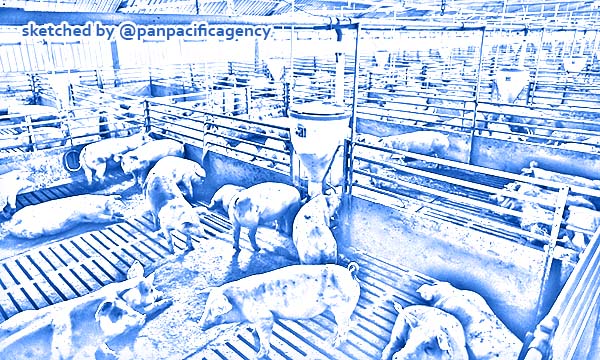New swine flu G4 virus with ‘pandemic potential’ found in China

African swine fever has prompted Vietnam to cull two million pigs in several months. Photo by Shutterstock/Dusan Petkovic. Sketched by the Pan Pacific Agency.
BEIJING, Jun 30, 2020, Orissa Post. Researchers in China have discovered a new type of swine flu that is capable of triggering a pandemic, according to a study in the US science journal PNAS, Orissa Post reported.
Named G4, it has genetically descended from the H1N1 strain of virus that caused a pandemic way back in 2009.
It possesses “all the essential hallmarks of being highly adapted to infect humans”, said the authors, scientists at Chinese universities and China’s Center for Disease Control and Prevention, in the study published Monday.
Between 2011 and 2018, researchers took 30,000 nasal swabs from pigs in slaughterhouses in about ten Chinese provinces and in a veterinary hospital, They then allowed them to isolate 179 swine flu viruses.
Pandemic threat
A bad new strain of influenza is among the top disease threats that experts are watching for, even as the world grapples to bring to an end the current wave of coronavirus pandemic.
The last pandemic flu the world encountered – the swine flu outbreak of 2009 that began in Mexico – was less deadly than initially feared, largely because many older people had some immunity to it, probably because of its similarity to other flu viruses that had circulated years before.
More than one in 10 swine workers had already been infected, according to antibody blood tests which showed exposure to the virus.
The tests also showed that as many as 4.4% of the general population also appeared to have been exposed.
The virus has therefore already passed from animals to humans but there is no evidence yet that it can be passed from human to human is the scientists’ main concern.
“It is of concern that human infection of G4 virus will further human adaptation and increase the risk of a human pandemic,” the researchers wrote.
The authors called for urgent and immediate measures to monitor people working in close contact with pigs.
James Wood, head of the department of veterinary medicine at Cambridge University, said: “The work comes as a salutary reminder that we are constantly at risk of new emergence of zoonotic pathogens and that farmed animals – with which humans have greater contact than with wildlife – may act as the source for important pandemic viruses.”
A zoonotic infection is caused by a pathogen that has jumped from a non-human animal into a human.